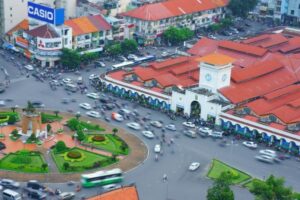| China, India, Indonesia, Uganda, and Vietnam are projected to be among the fastest-growing economies for the coming decade, according to researchers at the Growth Lab at Harvard University.
The new growth projections presented in The Atlas of Economic Complexity include the first detailed look at 2021 trade data, which reveal continued disruptions from the uneven economic recovery to the global pandemic. China is expected to be the fastest-growing economy per capita, although its growth rate is smaller than gains seen over the past decade.
Growth over the coming decade is projected to take off in three growth poles, East Asia, Eastern Europe, and East Africa. Several Asian economies already hold the necessary economic complexity to drive the fastest growth over the coming decade to 2031, led by China, Cambodia, Vietnam, Indonesia, Malaysia, and India.
In East Africa, several economies are expected to experience rapid growth, though driven more by population growth than gains in economic complexity, which include Uganda, Tanzania, and Mozambique. Eastern Europe holds strong growth potential for its continued advances in economic complexity, with Georgia, Lithuania, Belarus, Armenia, Latvia, Bosnia and Herzegovina, Romania, and Albania all ranking in the projected top 15 economies on a per capita basis.
Outside these growth poles, the projections also show potential for Egypt to achieve more rapid growth. Other developing regions face more challenging growth prospects by making fewer gains in their economic complexity, including Latin America and the Caribbean and West Africa.
“Countries that have diversified their production into more complex sectors, like Vietnam and China, are those that will lead global growth in the coming decade,” said Ricardo Hausmann, director of the Growth Lab, professor at the Harvard Kennedy School (HKS), and the leading researcher of The Atlas of Economic Complexity.
 “China and Vietnam already realised many of the income gains from their increased complexity. Nevertheless, they remain more complex than expected for their income level so will remain global growth poles.” “China and Vietnam already realised many of the income gains from their increased complexity. Nevertheless, they remain more complex than expected for their income level so will remain global growth poles.”
The Economic Complexity Index (ECI) captures the diversity and sophistication of the productive capabilities embedded in the exports of each country. The researchers place the diversity of productive knowledge—or knowhow—that a society has at the heart of the economic development process.
Economic growth requires the accumulation of new knowhow and its use to diversify production into more sophisticated—aka complex—activities. ECI is able to closely explain differences in country incomes – and to predict future growth.
The Growth Lab researchers released new 2021 ECI rankings, which show remarkable stability despite uneven economic recovery and lingering pandemic effects in 2021. The ECI ranking finds the most complex countries in the world are, in order, Japan, Switzerland, South Korea, Germany, and Singapore.
Other notable countries include the United Kingdom at 8th, the United States at 14th, France at 17th, and China at 18th. Among the most complex countries, the greatest improvements in the rankings for the decade ending in 2021 have been made by Romania (19th), the Philippines (33rd), and South Korea (3rd).
Oil prices rebounded slightly in 2021 while remaining moderate, leaving non-oil exports to feature more prominently in the export baskets of commodity economies. These economies saw an uptick in the economic complexity ranking, for the likes of Kuwait, Saudi Arabia, Qatar, and Iran, although these gains are not likely to be sustained with the rise in oil prices in 2022.
Outside of commodity economies, those developing economies that have made the greatest strides in improving their complexity include Laos (84th), Cambodia (83rd), and the Dominican Republic (58th). Those countries that show the fastest declines in the complexity rankings in the past decade have failed to diversify their exports, namely Panama (86th), Cuba (117th), Ghana (121st), and Brazil (70th).
The true value of the economic complexity measure is in its accuracy in predicting future growth, which ECI has been shown to do better than any other single measure in predicting growth.
By identifying those countries whose economic complexity exceeds expectations based on its income level, the researchers find a strong predictor of the countries that will grow faster in the coming decade.
The Atlas of Economic Complexity features data visualiSations covering over 5,000 goods and services to understand the economic dynamics and growth opportunities for every country worldwide.
|